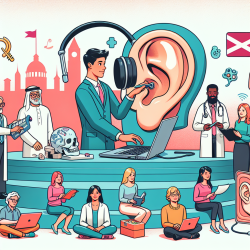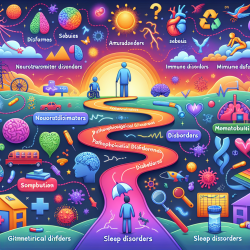Introduction
In the realm of speech-language pathology, understanding the broader context of mental health, especially within unique environments such as justice systems, can significantly enhance a practitioner's ability to deliver effective interventions. The research article titled "Mental health of people detained within the justice system in Africa: systematic review and meta-analysis" provides critical insights into the mental health challenges faced by individuals within these systems. This blog post aims to translate these findings into actionable strategies for practitioners, particularly those working with children, to improve outcomes through informed, data-driven approaches.
Key Findings from the Research
The systematic review and meta-analysis conducted by Lovett et al. (2019) highlights several key findings:
- High prevalence of mental disorders among people detained within the justice system in Africa, with substance use disorders at 38%, mood disorders at 22%, and psychotic disorders at 33%.
- Significant heterogeneity in the subpopulations studied, suggesting a need for context-specific interventions.
- Limited research on interventions, with only three studies focusing on treatment strategies.
- Challenges in detention conditions, including overcrowding and lack of mental health resources.
Implementing Research Outcomes in Practice
For practitioners, especially those providing online therapy services like TinyEYE, these findings underscore the importance of tailoring interventions to the specific needs of justice-involved populations. Here are some strategies to consider:
- Individualized Assessment: Utilize comprehensive assessments to identify specific mental health needs, considering the high prevalence of mood and psychotic disorders.
- Substance Use Interventions: Given the high rate of substance use disorders, incorporate substance use assessments and interventions into therapy plans.
- Context-Specific Approaches: Develop interventions that are sensitive to the cultural and environmental contexts of the populations served, recognizing the diverse needs across different detention settings.
- Collaborative Care Models: Work closely with other professionals, including mental health specialists and justice system personnel, to provide holistic care that addresses both mental health and environmental factors.
Encouraging Further Research
The review highlights a significant gap in intervention research within African justice systems. Practitioners are encouraged to engage in or support further research efforts to develop and test effective interventions. This could involve participating in collaborative research projects or advocating for funding and resources to support such initiatives.
Conclusion
By integrating the findings from this research into practice, speech-language pathologists and other practitioners can enhance their ability to support justice-involved individuals, particularly children, in achieving better mental health outcomes. For those interested in delving deeper into the research, the original paper provides a comprehensive overview and can be accessed here.










